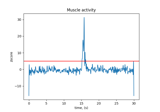mne.preprocessing.annotate_muscle_zscore¶
- mne.preprocessing.annotate_muscle_zscore(raw, threshold=4, ch_type=None, min_length_good=0.1, filter_freq=(110, 140), n_jobs=1, verbose=None)[source]¶
Create annotations for segments that likely contain muscle artifacts.
Detects data segments containing activity in the frequency range given by
filter_freqwhose envelope magnitude exceeds the specified z-score threshold, when summed across channels and divided bysqrt(n_channels). False-positive transient peaks are prevented by low-pass filtering the resulting z-score time series at 4 Hz. Only operates on a single channel type, ifch_typeisNoneit will select the first type in the listmag,grad,eeg. See 1 for background on choosingfilter_freqandthreshold.- Parameters
- rawinstance of
Raw Data to estimate segments with muscle artifacts.
- threshold
float The threshold in z-scores for marking segments as containing muscle activity artifacts.
- ch_type‘mag’ | ‘grad’ | ‘eeg’ |
None The type of sensors to use. If
Noneit will take the first type inmag,grad,eeg.- min_length_good
float|None The shortest allowed duration of “good data” (in seconds) between adjacent annotations; shorter segments will be incorporated into the surrounding annotations.``None`` is equivalent to
0. Default is0.1.- filter_freqarray_like, shape (2,)
The lower and upper frequencies of the band-pass filter. Default is
(110, 140).- n_jobs
int The number of jobs to run in parallel (default 1). Requires the joblib package.
- verbosebool,
str,int, orNone If not None, override default verbose level (see
mne.verbose()and Logging documentation for more). If used, it should be passed as a keyword-argument only.
- rawinstance of
- Returns
- annot
mne.Annotations Periods with muscle artifacts annotated as BAD_muscle.
- scores_muscle
array Z-score values averaged across channels for each sample.
- annot
References
- 1
Suresh Muthukumaraswamy. High-frequency brain activity and muscle artifacts in MEG/EEG: a review and recommendations. Frontiers in Human Neuroscience, 7:138, 2013. doi:10.3389/fnhum.2013.00138.
